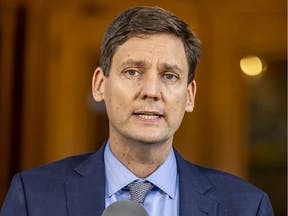The legislation on housing targets, Housing Supply Act, is likely to face backlash from some B.C. mayors who have previously warned that running roughshod over municipal land use laws could spark a legal challenge.
Katie DeRosa
On his first day in the Legislature, is B.C. Premier David Eby announcing two pieces of legislation that would remove rental and age restrictions in strata buildings and set affordable housing targets for municipalities, with the promise to overrule municipalities if they’re failing to hit the benchmarks. Photo by Darren Stone /Times Colonist files
On his first day in the Legislature, B.C. Premier David Eby announced two pieces of legislation that would remove rental and age restrictions in strata buildings and set affordable housing targets for municipalities, with the promise to overrule those that fail to hit the benchmarks.
Story continues below
The legislation on housing targets is likely to face backlash from some B.C. mayors who have previously warned that running roughshod over municipal land-use laws could spark a legal challenge.
The housing announcement just three days after Eby was sworn in as B.C.’s 37th premier is an attempt by the former attorney general and housing minister to make good on his promise to move quickly on the housing reforms that were a key plank of his leadership campaign.
Amendments to the Strata Property Act, if passed, would remove all rental restrictions from all B.C. strata buildings, which Eby estimated would turn thousands of empty units into homes for renters.
It would also make it illegal for strata to have 19-plus age restrictions that force out young families when they have a child. “Seniors only” strata will still be allowed.
Story continues below
“It is simply unacceptable that a British Columbian who is searching Craigslist for a place to rent can’t find a home and somebody who owns a condo is not permitted to rent that home to that individual,” Eby said at a press conference in the rotunda of the legislature. “It is equally unacceptable that a young couple that lives in a condo and decides to start a family has to start searching for a new home because that strata has a rule that everybody who lives in the unit has to be 19 years of age or older.”
Eby said there are approximately 2,900 strata units that are sitting empty because of rental restrictions, data based on owners who applied for exemptions to the speculation and vacancy tax.
The Housing Supply Act aims to increase the supply of housing in B.C. by establishing targets for municipalities where affordable housing is in short supply.
Story continues below
The targets will be set based on the housing needs reports that local governments are already required to create every five years. The first reports were due in April 2022.
The government said the targets will initially be applied to about eight to 10 municipalities that will be determined by community plans and growth projections based on census data. The premier’s office said work is already underway to identify those municipalities.
If the province determines the municipality is not taking actions to meet the targets, it can step in to force compliance through three options:
- An adviser appointed by the housing minister can review municipal processes to determine what’s stalling housing starts.
- The housing minister can issue a directive for the municipality to take specific action.
- As a last resort, the province can issue an order-in-council allowing it to override the municipality to force through new housing projects.
Story continues below
“My hope is we never have to use it,” Eby said of the provincial override powers. “(The Act) does have teeth and it needs to have teeth to make sure we’re meeting those goals.”
The legislation aims to speed up municipal zoning approval processes, which Eby says are outdated and slow down the construction of new buildings and redevelopments.
The MLA for Vancouver-Point Grey has been candid in his frustration with municipal governments that block the rezoning of affordable housing developments and he’s called out “NIMBYism” by neighbourhood groups that oppose density.
However, several B.C. mayors told Postmedia News in September, when Eby released his housing platform, that the plan to override municipalities will face significant backlash and they would rather see the province use the “carrot approach” of offering more financial support and incentives instead of wielding a stick.
Story continues below
Eby’s housing platform also called for a flipping tax that will apply to the sale of a residential property. The tax rate, which was not specified, will be highest for those who hold properties for the shortest period of time and goes down to zero after two years.
It’s unclear when the government will introduce legislation to create such a tax.
Source: Vancouver Sun




